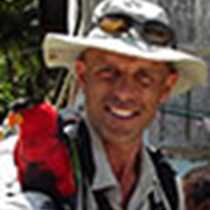At sea to South Georgia
During our second day at sea from the Falkland Islands to South Georgia we continued our preparation for arrival tomorrow at this much anticipated destination. Further presentations about our plans were mixed with a biosecurity operation, where all gear to be taken ashore was inspected and thoroughly cleaned. Remote oceanic islands such as South Georgia have been heavily impacted over the centuries by the introduction of non-native species. Some of these introductions have been deliberate, such as the reindeer introduced by Norwegian whalers, while others such as rats the accidental result of events like shipwrecks. But the changes to an ecosystem that has evolved in the absence of terrestrial mammals cannot be underestimated. Grazing by reindeer has dramatically altered the vegetation in parts of the island while rats have been responsible for the loss of the endemic South Georgia pipit (a small songbird) from many parts of the island. The Government of South Georgia and the South Sandwich Islands is preparing a programme of rat eradication for South Georgia and discussing the future of the reindeer herds. There have also been impacts from introductions of non-native plants and even diseases. In most cases it is difficult to know from which source these arrived, but we must play our part to make sure we are not responsible for further introductions.
We experienced better weather than yesterday and relatively calm seas. There was still a swell running and some wind but both were from our stern and allowed for a very comfortable day. The sky was clear and sunshine always improves the outlook. Things were looking so good that by the time we reached Shag Rocks the decision was made to drop Zodiacs for an exploratory dive by our Undersea Specialist at this remote and rarely explored location. As the day ended the quantity of marine life around the vessel increased, with flocks of Antarctic prions much in evidence and groups of Antarctic fur seals in the water. The presence of these animals hinted at the abundance of life awaiting us when we reach South Georgia tomorrow.




